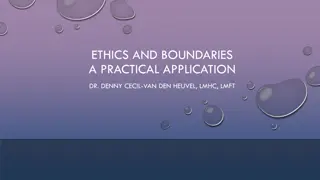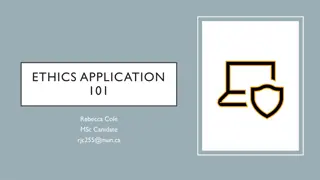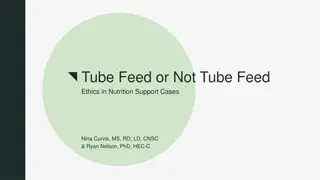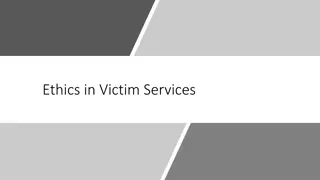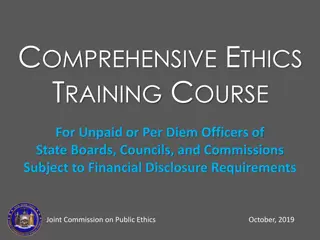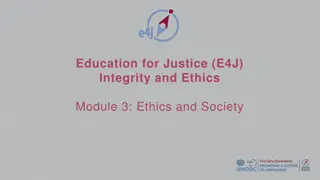
Ethics in Distribution: Reflections on Justice & Fairness
Explore ethical dilemmas in distribution such as inheritance, organ transplants, and workplace bonuses. Reflect on distributive justice, fairness, and crafting arguments about fairness in resource allocation.
Uploaded on | 2 Views
Download Presentation

Please find below an Image/Link to download the presentation.
The content on the website is provided AS IS for your information and personal use only. It may not be sold, licensed, or shared on other websites without obtaining consent from the author. If you encounter any issues during the download, it is possible that the publisher has removed the file from their server.
You are allowed to download the files provided on this website for personal or commercial use, subject to the condition that they are used lawfully. All files are the property of their respective owners.
The content on the website is provided AS IS for your information and personal use only. It may not be sold, licensed, or shared on other websites without obtaining consent from the author.
E N D
Presentation Transcript
Embedded Ethics: Disability and Software Accessibility Module 1
2 Distributive Justice Any case in which it is not possible to give everyone as much as they would want raises ethical questions of distributive justice distributive justice. Photo by Elaine Casap on Unsplash
Inheritance When a person passes away, their property is transferred to other people in their life. In some cases, they leave a will that specifies to whom their property should be given. When there is no will, how should their property be distributed? 3
Organ Transplants Organ transplants are a clear example of distributive justice. There are usually more people who need organs than organs available. How do we decide who should get the limited supply of organs? 4
Bonuses at Work At some workplaces, the management will give bonuses to employees after a successful year. How should the bonuses be given out to employees? Should some receive a greater bonus than others? 5
Justice and Fairness Ethics asks two questions: 1. Are there ways of distributing these resources that are unjust or unfair ? E.g. You shouldn t give the whole inheritance to just one person! While many people become upset when they do not get what they want, if a decision really is unjust or unfair, they would be entitled to feel upset. 2. Is there some just or fair way that we should distribute these resources? 6
Relativism Of course, people will disagree about which of these factors matter. But are their answers just a matter of opinion? Ethics? One reason to think that moral questions are not our intuitive response to being wronged by another person. Another reason is that it is possible to craft arguments about fairness. not just a matter of opinion is 7
Crafting Arguments about Fairness Primary Stakeholders To make an argument that some distribution is fair, we can begin by looking at the perspectives of the primary stakeholders who might receive resources. For example, in the inheritance case, you might identify the different people who might be eligible to receive inheritance: Children Spouses 8
Crafting Arguments about Fairness: Primary Stakeholders One argument that a distribution is fair or just is that it takes into account the positions of all of these primary stakeholders. In other words, you need to be able to imagine justifying your decision to each internal stakeholder. This does not necessarily mean giving them equal shares. However, it does mean that any valid claim from an internal stakeholder should be acknowledged in the distribution. When justifying a distribution to the stakeholders, we will use the following building blocks . 9
Building Blocks of a Theory of Fairness Rights to a minimum Rights to a minimum: making sure everyone has a bare minimum needed to survive, thrive, etc. Efficiency: Efficiency: making sure resources are allocated where they are used most effectively. Efficiency Equality: Equality: making sure everyone gets the same amount of resources, or that no one receives more or less for arbitrary reasons. Desert: Desert: making sure people get what they deserve (e.g. because they have worked for it) 10
Zooming in on Equality Egalitarianism Assign resources equally. Equality: Equality: making sure that everyone gets the same amount of resources, or that no one receives more or less for arbitrary reasons receives more or less for arbitrary reasons. no one Disability Disability Sexuality Sexuality Gender Gender Race Race Other context Other context- -specific factors specific factors 11
Back to the Inheritance Case Equality: Equality: making sure that everyone gets the same amount of resources, or that no one receives more or less for arbitrary reasons. $200,000 $1,000,000 Rights to a minimum Rights to a minimum: making sure that everyone has a bare minimum needed to survive, thrive, etc. $200,000 Desert: Desert: making sure people get what they deserve (e.g. because they have worked for it) $600,000 12
Crafting Arguments about Fairness: Primary Stakeholders In the other examples (organ transplants, bonuses), the relevant factors might be different. E.g. In the bonuses case, perhaps what people deserve (based upon how hard they ve worked) is much more important! Desert: making sure people get what they deserve (e.g. because they have worked for it) 13
Crafting Argument about Fairness: Secondary Stakeholders We can also craft other arguments about a fair distribution by looking at secondary stakeholders who do not necessarily receive resources themselves, but instead have relevant expertise or knowledge about the situation. 14
Crafting Argument about Fairness: Secondary Stakeholders Secondary stakeholders may help to reveal other limits on a fair distribution. E.g. a family counselor might know which ways of distributing the inheritance would cause harm to family bonds Secondary stakeholders may also provide information that is necessary to assess or put into practice the claims of the primary stakeholders. E.g. a financial planner might know the minimum inheritance required for a reasonably comfortable, secure future. 15

